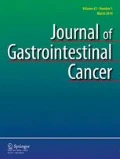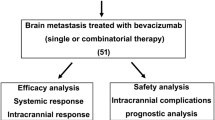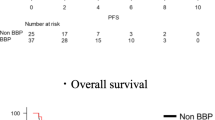Abstract
Background
Brain metastases are rare in patients with colorectal cancer, but the incidence is expected to rise due to prolonged survival resulting from more effective regimens including anti-EGF-receptor and anti-angiogenic antibodies. Because of the potential fear of intracranial hemorrhage, patients with colorectal brain metastases have been excluded from clinical trials involving bevacizumab or aflibercept.
Patients
Five patients with colorectal brain metastases treated with bevacizumab-containing chemotherapy regimen following either neurosurgery, radiosurgery, or whole-brain radiotherapy were identified between 2009 and 2014. The clinicopathological data and outcomes for these patients were reviewed.
Results
Mean time to disease progression concerning brain metastases was 14.8 months (range 5–25). Overall survival was 26.2 months (range 7–42 months) and overall survival since diagnosis of brain metastases was 20.6 month (7–42). Best response was a partial response in two and a stable disease in three patients. Treatment-related adverse events were mild hypertension (grade 1), diarrhea (grade 1), and fatigue (grade 1). No intracranial hemorrhage was observed.
Conclusion
Bevacizumab in combination with chemotherapy is a feasible option for palliative treatment of patients with colorectal brain metastasis with a good safety profile.



Similar content being viewed by others
Abbreviations
- CRC:
-
Colorectal cancer
- OS:
-
Overall survival
- CRP:
-
C-reactive protein
- EGF:
-
Epidermal growth factor
- FDA:
-
Food and Drug Administration
- VEGF:
-
Vascular endothelial growth factor
- CT:
-
Computed tomography
- NSCLC:
-
Non-small cell lung cancer
- MRI:
-
Magnetic resonance imaging
- CTCAE:
-
Common terminology criteria for adverse events
- CNS:
-
Central nervous system
- ITT:
-
Intention to treat
- RCT:
-
Randomized control trial
- ICH:
-
Intracerebral hemorrhage
- WBRT:
-
Whole-brain radiotherapy
References
Ferlay J, Shin HR, et al. Estimates of worldwide burden of cancer in 2008: GLOBOCAN 2008. Int J Cancer. 2008;127(12):2893–917.
Van der Pool AE, Damhuis RA, et al. Trends in incidence, treatment and survival of patients with stage IV colorectal cancer: a population based series. Color Dis. 2012;14(1):56–61.
Kopetz S, Chang GJ, et al. Improved survival in metastatic colorectal cancer is associated with adoption of hepatic resection and improved chemotherapy. J Clin Oncol. 2009;27(22):3677–83.
Heinemann V, Fischer von Weikersthal L, Decker T, et al. Randomized comparison of FOLFIRI plus cetuximab versus FOLFIRI plus bevacizumab as first-line treatment of KRAS wild-type metastatic colorectal cancer: German AIO study KRK-0306 (FIRE-3). J Clin Oncol. 2013;31:2013 (suppl; abstr LBA3506).
Van Cutsem E, Peeters M, Siena S, Humblet Y, Hendlisz A, et al. Open label phase III trial of panitumumab plus best supportive care compared with best supportive care alone in patients with chemotherapy refractory metastatic colorectal cancer. J Clin Oncol. 2007;25(13):1658–64.
Van Cutsem E, Tabernero J, Lakomy R, et al. Addition of aflibercept to fluorouracil, leucovorin, and irinotecan improves survival in a phase III randomized trial in patients with metastatic colorectal cancer previously treated with an oxaliplatin-based regimen. J Clin Oncol. 2012;30:3499–506.
Cunningham D, Atkin W, Lenz HJ, Lynch HT, et al. Colorectal cancer. Lancet. 2010;375:1030–47.
Schouten LJ, Rutten J, Huveneers HA, et al. Incidence of brain metastases in a cohort of patients with carcinoma of the breast, colon, kidney, and lung and melanoma. Cancer. 2002;94:2698–705.
Jung M, Ahn JB, Chang JH, Suh CO, Hong S, et al. Brain metastases from colorectal carcinoma: prognostic factors and outcome. J Neuro-Oncol. 2011;101(1):49–55.
Ferrara N, Davis-Smyth T. The biology of vascular endothelial growth factor. Endocr Rev. 1997;18:4–25.
Gerber HP, Dixit V, Ferrara N, et al. Vascular endothelial growth factor induces expression of the antiapoptotic proteins Bcl-2 and A1 in vascular endothelial cells. J Biol Chem. 1998;273:13313–6.
Dvorak HF, Brown LF, Detmar M, Dvorak AM, et al. Vascular permeability factor/vascular endothelial growth factor, microvascular hyperpermeability, and angiogenesis. Am J Pathol. 1995;146:1029–39.
Senger DR, Galli SJ, Dvorak AM, Perruzzi CA, Harvey VS, Dvorak HF. Tumor cells secrete a vascular permeability factor that promotes accumulation of ascites fluid. Science. 1983;219:983–5.
Folkman J. Tumor angiogenesis: therapeutic implications. NEJM. 1971;285:1182–6.
Hurwitz H, Fehrenbacher L, Novotny W, et al. Bevacizumab plus irinotecan, fluorouracil, and leucovorin for metastatic colorectal cancer. NEJM. 2004;350:2335–42.
Saltz LB, Clarke S, Diaz-Rubio E, Scheithauer A, Figer R, et al. Bevacizumab in combination with oxaliplatin-based chemotherapy as first-line therapy in metastatic colorectal cancer: a randomized phase III study. J Clin Oncol. 2008;26(12):2013–9.
Giantano BJ, Catalano PJ, Meropol NJ, O’Dwyer PJ, et al. Bevacizumab in combination with oxaliplatin, fluorouracil, and leucovorin (FOLFOX4) for previously treated metastatic colorectal cancer, results from the Eastern Cooperative Oncology Group Study E3200. J Clin Oncol. 2007;25(12):1539–44.
Bennouna J, Sastre J, Arnold D, Österlund P, et al. Continuation of bevacizumab after first progression in metastatic colorectal cancer (ML18147): a randomised phase 3 trial. Lancet Oncol. 2013;14(1):29–37.
Gordon MS, Margolin K, Talpaz M, et al. Phase I safety and pharmacokinetic study of recombinant human anti-vascular endothelial growth factor in patients with advanced cancer. J Clin Oncol. 2001;19:843–50.
Sandler A, Gray R, Perry MC, et al. Paclitaxel–carboplatin alone or with bevacizumab for non–small-cell lung cancer. NEJM. 2006;355:2542–50.
Escudier B, Pluzanska A, Koralewski P, et al. Bevacizumab plus interferon alfa-2a for treatment of metastatic renal cell carcinoma: a randomised, double-blind phase III trial. Lancet. 2007;370:2103–11.
Socinski MA, Langer CJ, Huang JE, et al. Safety of bevacizumab in patients with non-small-cell lung cancer and brain metastases. J Clin Oncol. 2009;27:5255–61.
Archer V, Reck M, Sandler AB, et al. Risk of symptomatic central nervous system (CNS) progression and secondary hemorrhage in patients with non-squamous non-small cell lung cancer (NSCLC) receiving bevacizumab (BV)-based first-line therapy. J Clin Oncol. 2008;26:15. abstr 8114.
Therasse P, Arbuck SG, et al. New guidelines to evaluate the response to treatment in solid tumors. J Natl Cancer Inst. 2000;92(3):205–16.
Eisenhauer EA, Therasse P, Bogaerts J, et al. New response evaluation criteria in solid tumours: revised RECIST guideline (version 1.1). Eur J Cancer. 2009;45(2):228–47.
Besse B, Lasserre SF, Compton P, Huang J, Augustus S, Rohr UP, et al. Bevacizumab safety in patients with central nervous system metastases. Clin Cancer Res. 2010;16(1):269–78.
Crinò L, Dansin E, Garrido P, et al. Safety and efficacy of first-line bevacizumab-based therapy in advanced non-squamous non-small-cell lung cancer (SAiL, MO19390): a phase 4 study. Lancet. 2010;11:733–40.
Carden CP, Larkin JM, Rosenthal MA. What is the risk of intracranial bleeding during anti-VEGF therapy? Neuro Oncol. 2008;10:624–30.
Besse B, Le Moulec S, Senellart H, et al. Final overall survival (OS) results of a non comparative phase II study of bevacizumab (B) plus first-line chemotherapy or second-line erlotinib (E) in nonsquamous NSCLC patients with asymptomatic untreated brain metastases (BM)(BRAIN). J Clin Oncol. 2013; 31, (suppl; abstr 8059); ASCO Anual Meeting 2013; Abstract Number: 8059.
Go PH, Klaassen Z, Meadows MC, Chamberlain R, et al. Gastrointestinal cancer and brain metastasis—a rare and omnious sign. Cancer. 2011;117(16):3630–40.
Cascino TL, Leavengood JM, Kemeny N, Posner JB. Brain metastases from colon cancer. J Neuro-Oncol. 1983;1:203–9.
Wronski M, Arbit E. Resection of brain metastases from colorectal carcinoma in 73 patients. Cancer. 1998;85:1677–85.
Bartelt S, Momm F, Weissenberger C, Lutterbach J, et al. Patients with brain metastases from gastrointestinal tract cancer treated with whole brain radiation therapy: prognostic factors and survival. World J Gastroenterol. 2004;10:3345–8.
Farnell GF, Buckner JC, Cascino TL, O’Connell MJ, et al. Brain metastases from colorectal carcinoma. The long term survivors. Cancer. 1996;78:711–6.
Hammoud MA, McCutcheon IE, Elsouki R, Schoppa D, et al. Colorectal carcinoma and brain metastasis: distribution, treatment, and survival. Ann Surg Oncol. 1996;3:453–63.
Suzuki Y, Yamaguchi T, Matsumoto H, Nakano D, et al. Prognostic factors and treatment effects in patients with curatively resected brain metastasis from colorectal cancer. Dis Colon Rectum. 2014;57(1):56–63.
Tsao MN, Lloyd N, Wong RK, Chow E, Rakovitch E, Laperriere N. Whole brain radiotherapy for the treatment of newly diagnosed multiple brain metastases. Cochrane Database Syst Rev. 2012; 4:CD003869. doi:10.1002/14651858.CD003869.pub3.
Patil CG, Pricola K, Sarmiento JM, Garg SK, Bryant A, Black Kl, et al. Whole brain radiation therapy (WBRt) alone versus WBRt and radiosurgery for the treatment of brain metastases. Cochrane Database Syst Rev. 2012; 9.
O’Neill BP, Iturria NJ, Link MJ, Pollock BE, Ballman KV, O’Fallon JR, et al. A comparison of surgical resection and stereotactic radiosurgery in the treatment of solitary brain metastases. Int J Radiat Oncol Biol Phys. 2003;55:1169–76.
Kondziolka D, Patel A, Lunsford LD, Kassam A, Flickinger JC, et al. Stereotactic radiosurgery plus whole brain radiotherapy versus radiotherapy alone for patients with multiple brain metastases. Int J Radiat Oncol Biol Phys. 1999;45:427–34.
Poulsen NHS, Grunnet K, Sorensen M, Olsen P, et al. Bevacizumab plus irinotecan in the treatment patients with progressive recurrent malignant brain tumours. Acta Oncol. 2009;48:52–8.
Vredenburg JJ, Desjardins A, Hernon JE, Dowell JM, et al. Phase II trial of bevacizumab and irinotecan in recurrent malignant glioma. Clin Cancer Res. 2007;13:1253–9.
Friedman HS, Prados MD, Wen PY, Mikkelsen T, Schiff D, Abrey LE, et al. Bevacizumab alone and in combination with irinotecan in recurrent glioblastoma. J Clin Oncol. 2009;27(28):4733–40.
Gilbert MR, Dignam JJ, Armstrong TS, Wefel JS, Blumenthal DT, et al. A randomized trial of bevacizumab for newly diagnosed glioblastoma. NEJM. 2014;370(8):699–708.
Chinot OL, Wick W, Mason W, Henriksson R, Saran F, et al. Bevacizumab plus radiotherapy-temozolomide for newly diagnosed glioblastoma. NEJM. 2014;370(8):709–22.
Paez-Ribes M, Allen E, Hudock J, Takeda T, Okuyama H, et al. Antiangiogenic therapy elicits malignant progression of tumors to increased local invasion and distant metastasis. Cancer Cell. 2009;15:220–31.
Author information
Authors and Affiliations
Corresponding author
Ethics declarations
Conflict of Interest
O. Waidmann received a travel grant from Roche, and O. Bähr received consulting fees and travel grants from Roche. S. Zeuzem and J. Trojan received consulting fees from Roche.
Financial Support
Nothing to declare
Electronic Supplementary Material
Below is the link to the electronic supplementary material.
ESM 1
(DOC 41 kb)
Appendix
Appendix
Rights and permissions
About this article
Cite this article
Finkelmeier, F., You, SJ., Waidmann, O. et al. Bevacizumab in Combination with Chemotherapy for Colorectal Brain Metastasis. J Gastrointest Canc 47, 82–88 (2016). https://doi.org/10.1007/s12029-015-9795-z
Published:
Issue Date:
DOI: https://doi.org/10.1007/s12029-015-9795-z




